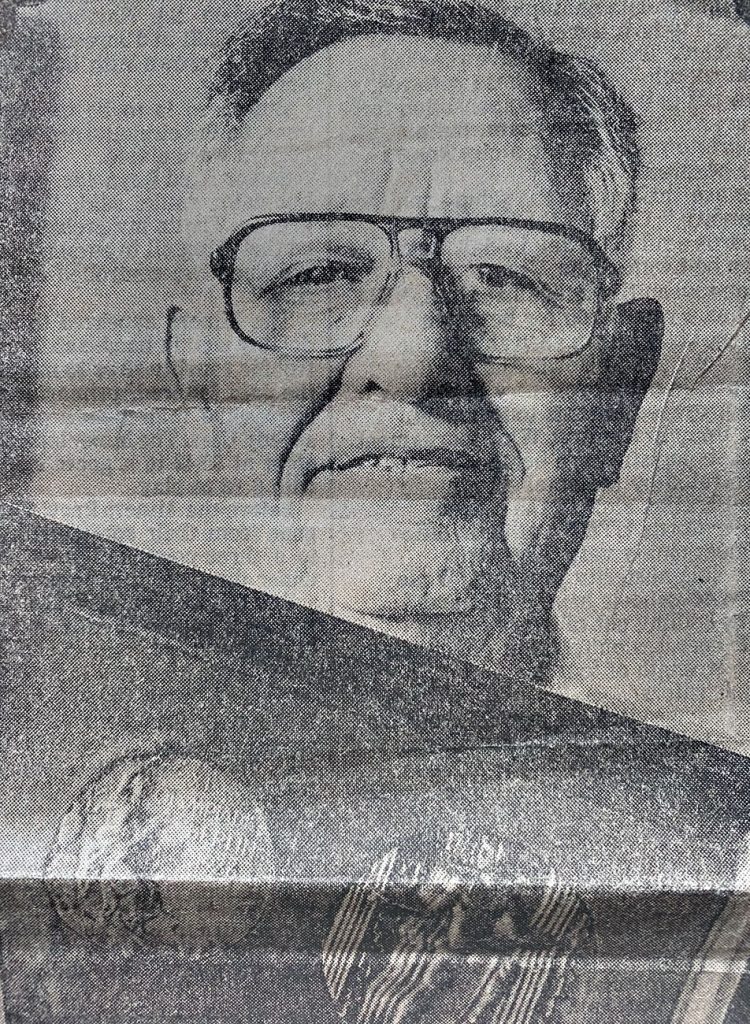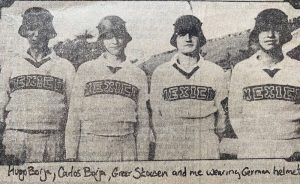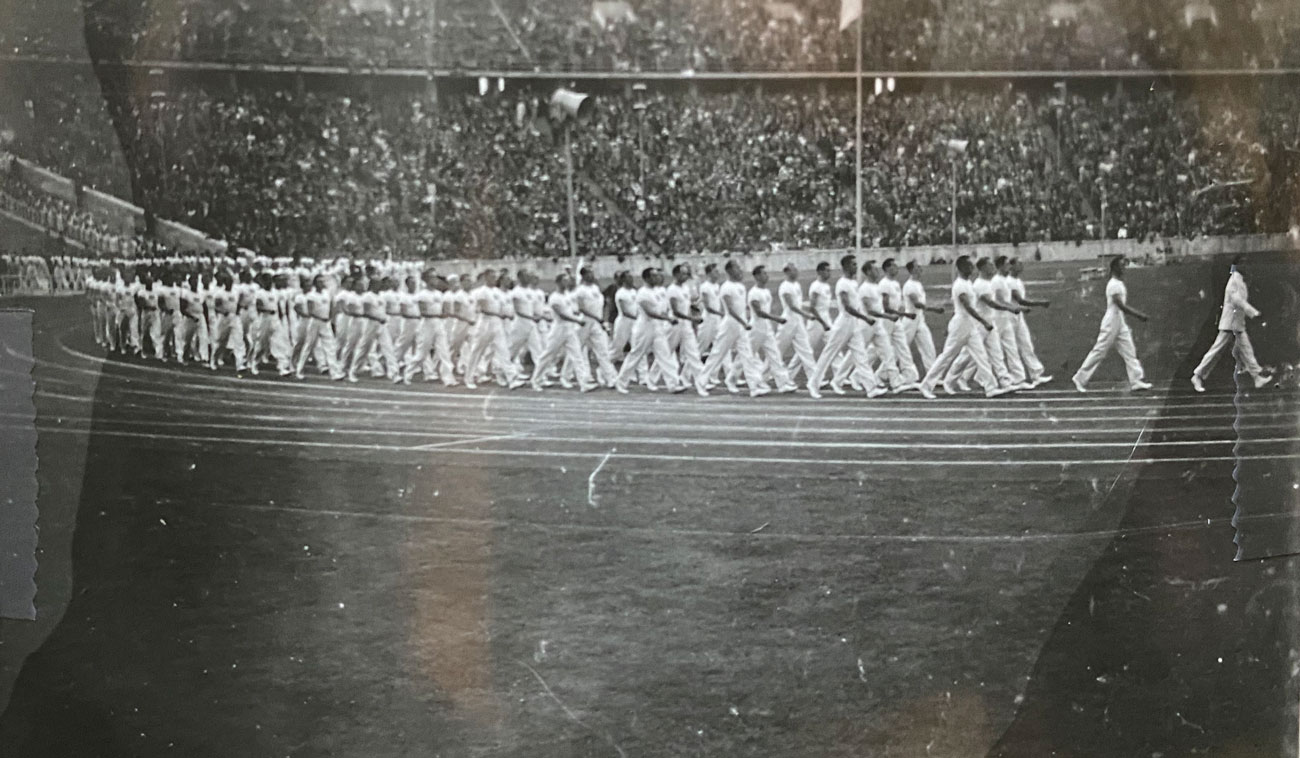Politics didn’t deter martinez from returning with a bronze
by Ruben Villegas – El Paso Time Staff Writer | March 4, 1984
He is 73. Retired.
His memories are vivid.
There is a grandeur about winning a bronze medal at the 1936 Olympics. Yet there are elements that are haunting.
For Francisco Martinez, the memories focus in on more than just the thrill of victory. They focus on discrimination, politics and the reality of war.
 Martinez practiced two months in Mexico City before departing – by ship – for the XI ‘Olympidia’ in Berlin, Germany in 1936. There was a two-day stop in Cuba where they practiced until the immense heat became unbearable. In Britian there were the ominous gales, which commanded 50 foot waves to whip the ship’s hull.
Martinez practiced two months in Mexico City before departing – by ship – for the XI ‘Olympidia’ in Berlin, Germany in 1936. There was a two-day stop in Cuba where they practiced until the immense heat became unbearable. In Britian there were the ominous gales, which commanded 50 foot waves to whip the ship’s hull.
Once in Berlin, the Mexican delegation was housed at the end of the Olympic village. “There was a lot of discrimination out there with the blacks.” Martinez said. “They were all put in the back of the village.”
And that is how Martinez met Jesse Owens.
“We became real good friends because I spoke English.” Martinez said. “Jesse, because of how good he was, couldn’t leave the village or the entire population would try to grab him.”
“They would steal his shoes, they cut his tie, the U.S. team had to send for running shoes from the U.S. because the Germans would steal them. I asked him how his team was treating him and he said, ‘We know where we are.'”
Martinez learned that the Germans’ hatred for the United States also would affect him.
As a youth, Martinez knew about the South El Paso gangs of the 1930s. He also knew about basketball.
“When we played basketball in South El Paso, we played on dirt and rocks so every one learned not to fall,” Martinez said.
One day a teacher saw Martinez playing, stopped him and told him about a sponsorship program at the YMCA.
“I could go and get sponsored but I had to visit a lawyer in the Mills Building,” Martinez said. “I was wearing my tennis shoes with my toes sticking out. I had long hair because I had no money for haircuts. I was wearing my jeans – my only pair – which could stand up alone if I took them off. When I got to the lawyer’s office, his secretary tried to throw me out.”
The lawyer overlooked Martinez’s appearance and agreed to sponsor him.
“They put me with 13-14 year old kids because I was too good. Then they moved me to the 15-16, and while I was 15 I was playing the big boys who were all college graduates. That’s where I go all the experience.”
Martinez later joined a church league, which led to his playing for the McNutt Oilers in a local semi-pro basketball league. But his Olympic ticket was forthcoming.
Martinez encountered a problem of sorts when he found out basketball games would be played outdoors. “Because the Germans hated the U.S., everything was done the opposite of how the U.S. did it.” Martinez said. “Since basketballs were made in America the Germans had their own basketballs built. It was like a soccer ball with a lot of stitches that would make it bounce everywhere. We couldn’t dribble it so we just passed it around.”
 Mexico lost to the United States and played Poland for third place. Mexico won. “We were beating Poland in the first half.” Martinez said. “In the second half a torrential rain came down. We were playing in ankle-deep mud. We couldn’t play but we beat them 25-14.”
Mexico lost to the United States and played Poland for third place. Mexico won. “We were beating Poland in the first half.” Martinez said. “In the second half a torrential rain came down. We were playing in ankle-deep mud. We couldn’t play but we beat them 25-14.”
And with the end of the Olympics began the start of Martinez’s realization that war was indeed close at hand.
Martinez also played for San Buena Ventura, a small town in Chihuahua, which won the Chihuahua state basketball tournament in 1936. “We were a little town and Mexico City had heard about us.” Martinez said. “They started recognizing us in Mexico. I was born and raised in El Paso but the Olympic rules say if your father and mother were born in the country you can compete for it.”
Martinez who had just completed his freshman year at New Mexico A&M (now known as New Mexico State) opted for the Olympics. “I couldn’t make the U.S. Olympic team because they were all too tall. So I and Greer Skousen, a Colonia Juarez mormon, left to play for Mexico.”
Martinez had three years of college eligibility left.
By 1936 Hitler was busy building his armed forces. “They invited the Mexican delegation to remain an extra 22 days in Germany, all expenses paid, ” Martinez said. “We found out later Hitler had said, ‘If we win the war you’ll get all that United States took away from you,’ like Kansas and Oklahoma.”
The Mexican team stayed.
“After the Games they invited us to go and see the gliders on the long hills,” Martinez said. “A general asked me if I wanted to ride with their most experienced pilot, who was 13 years old. I told him he was crazy. They were training these kids and getting them ready for the Air Force.” But Martinez also knew of other war preparations.
“They took us on a tour of a factory where they were making dyes, but they didn’t allow any photos.” Martinez said. “I got there late and when I took my camera out they snatched it out of my hands right away. I had to explain I did not know their policy. Actually that dye factory could be turned into gas overnight.”
And there was more.
“Hitler had to travel 15 miles to a party and there were soldiers with guns standing shoulder-to-shoulder, back-to-back along every inch of that 15 miles,” Martinez said. “We also saw several groups being hauled out of the party.”
The Germans knew Martinez was an American. Before leaving, he was given a sheet detailing his activities during his 22-day stay. “It opens your eyes for someone from the states to see what’s going on.” Martinez said. “I saw the preparation for the war and saw all the big generals.”
The 1936 Mexican basketball team is the only one to have won an Olympic medal. “The 20th of November used to be an Army holiday. Now its an Army and athletes holiday.” Martinez said.
Martinez returned home with his bronze medal and a knowledge of the sport that helped propel the Aggies to three straight Border Conference titles. The Aggies also were invited to the nationals in Madison Square Garden where they lost in the opening round to Long Island. They played Roanoke (Va.) College in an exhibition.
“We had Long Island by five points with 2 1/2 minutes to play and they fouled me out.” Martinez said. “I made four fouls without touching anyone because they had sectional referees who called it according to where they were from.”
With an engineering degree in hand (“The engineering dean said he didn’t like athletes because they never finished”) Martinez joined the Manpower Commission to help build airports. “Then I got a call from an old friend in Los Alamos who offered me housing plus $75 a week to go to Los Alamos,” Martinez said. “The pay then was about $15 a week. I was gone for 20 year and lost all my buddies.”
At 73, Martinez now keeps busy doing odd jobs around his El Paso home. Martinez has five children – ages 27-42 – plus six grandchildren to think about. And yes, Martinez said, one grandchild plays basketball.
Of the original 11 Mexican Olympic team players, eight are still living, Martinez said. But the memories linger.
“Whenever you go to the Olympics its something to cherish for the rest of your life,” Martinez said. “It’s a thrill regardless whether you win or lose.
This article was posted by alex@toolboxwebdesign.com
